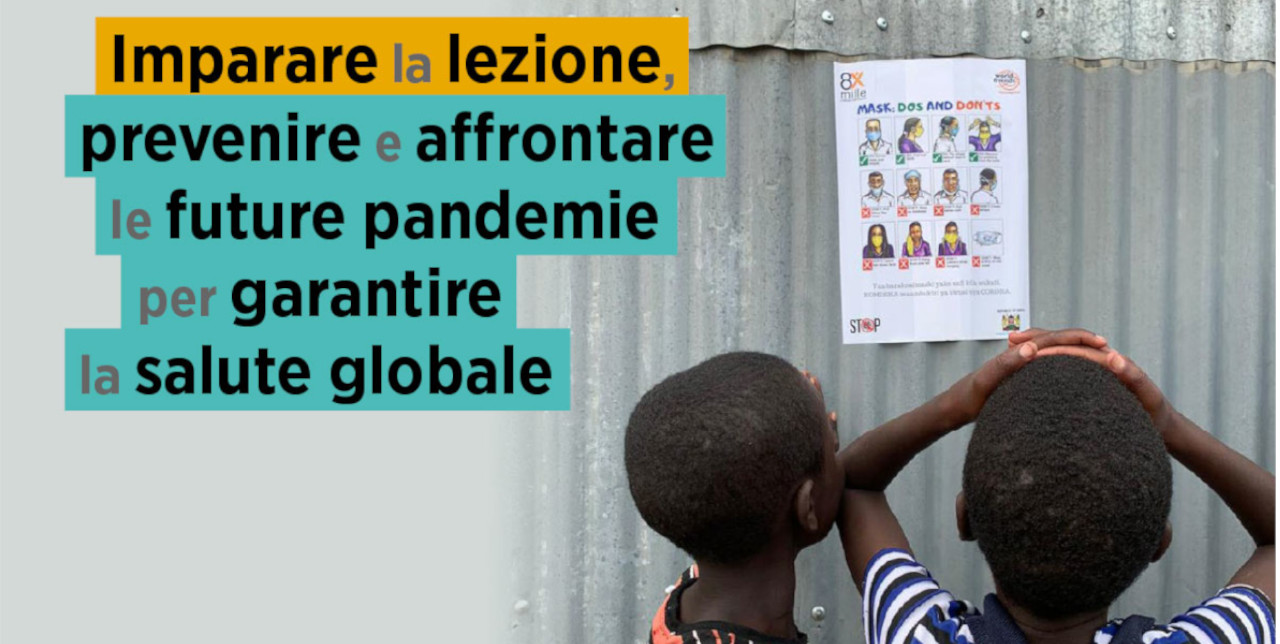28-06-2022 | di COOPI
Civil society for truly inclusive global health governance
On 22 June 2022 in Rome, the presentation of the policy paper 'Learning lessons, preventing and tackling future pandemics to ensure global health' took place in the Senate, produced by the Italian Global Health Network, of which COOPI - Cooperazione Internazionale is a member, Aidos and Friends of the Global Fund Europe.
Some of the main points that emerged are :
- To support a global health architecture coordinated by the WHO, which enhances the competencies and capacities of existing global and regional health partners in the field of health prevention
- To include civil society, associations of people affected by disease and women's associations in the governance of international organisations and mechanisms;
- To build and sustain strong public and community health systems rooted in the territories, thus ensuring access to universal health coverage.
Recalling the virtual visit to Ukraine that took place in the Senate on 24 May on the current health situation in the country, Pd Senator Alessandro Alfieri said: "Italy's contribution to the Global Fund for Health is fundamental not only for the global fight against Covid but also for the war in Ukraine. It is important to learn the lessons of the pandemic and continue to fight against TB, malaria and HIV as well, supporting Italy's bi- and multilateral commitments and international cooperation activities. This is why we intend to present a motion in the Foreign Affairs Committee so that Italy will guarantee the necessary resources when renewing the Global Fund".
Marina Sereni, Deputy Minister of Foreign Affairs and International Cooperation, also reiterates this: "We share the recommendation that comes from civil society organisations, committed to the health sector, to strengthen the institutional architecture and find new resources with tools that are inclusive and that take into account the important experience of the Global Fund", bringing together all the actors involved with an approach that is certainly more laborious but the only one capable of making progress.
In this regard, Stefania Burbo on behalf of the Italian Global Health Network, a network of 11 NGOs committed to the right to health - ActionAid, Aidos, Amref Health Africa, Cesvi, Cmsr, Cope, Cospe, Doctors with Africa Cuamm, Medicus Mundi Italy, World Friends and COOPI - call for "the new Financial Intermediary Fund (Fif) supported by the G20 to represent all the countries of the world, avoiding a 'top-down' approach through the participation of civil societies, which play a fundamental role as a link between formal health systems and communities".
Since the beginning of the pandemic, "the Global Fund has been at the forefront of supporting low- and middle-income countries with personal protective equipment, diagnostic tests and medicines, including oxygen," recalled Dianne Stewart , Head of External Relations and Communications, Global Fund. "We are also able to intervene quickly in cases of conflict, such as in Ukraine, where we have increased our support to ensure continuity of treatment for HIV and TB patients both in the country and in Moldova, where many refugees have found shelter. The Global Fund will continue to invest in strengthening health systems to protect the world from the risk of future pandemics".
In the future, "we need to improve our genomic and clinical surveillance capabilities, to provide early detection and warning of pandemic threats, and this will also help prevent the spread of antimicrobial resistance," concludes Stefano Vella, of the Università Cattolica Sacro Cuore and Friends of the Global Fund Europe, "the lesson learnt from the Covid-19 crises, but also from the previous Sars, Aids, Ebola, is that we are all witnessing animal spillover, which should make us realise the importance of One Health, of the intertwining of human and animal health and the environment, particularly now that we are approaching 10 billion people in the world."
The policy paper "Learning Lessons, Preventing and Coping with Future Pandemics to Ensure Global Health" is online here.



